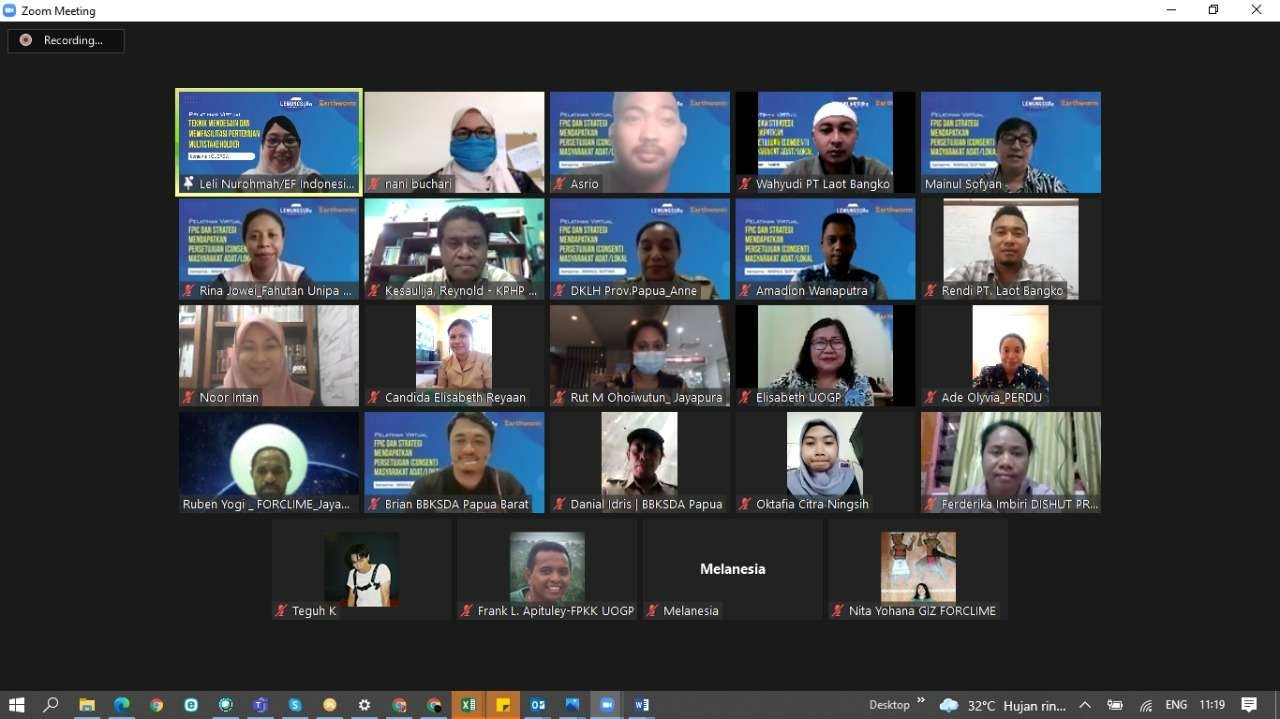
Prior to engaging in any development activities at the site level, it is necessary to secure the consent of local communities as the parties that will be potentially affected the most by said development. It is thus vital to gain an understanding of how to seek the consent of local communities in accordance with adequate procedures, ethics and processes so that potential conflicts can be minimized. To that end, FORCLIME facilitated the participation of representatives of the government, NGOs and academics working within the provinces of Papua and West Papua in three training sessions that addressed the issue of Free, Prior and Informed Consent (FPIC) and that were organized by the Earthworm Foundation in conjunction with its business division, Lemungsure.
The FPIC training sessions were held online on 20 September, 28 September and 5 October, 2021. In total, 20 participants were facilitated by FORCLIME and ultimately took part in the training sessions. These participants were drawn from the forestry services of Papua and West Papua provinces, the Natural Resources Conservation Agency (BBKSDA) of Papua and West Papua, the Wasur National Park, the Tambrauw Forest Management Unit (KPHP), KPHP Sorong Selatan, the University of Papua, Cenderawasih University, Ottow Geissler Papua University, PERDU Manokwari (a local NGO) and FORCLIME. During the sessions, participants received training in various essential issues that require consideration prior to the initiation of any development activities that directly relate to the management of natural resources and traditional communities, including:
1. Definitions, principles and stages of FPIC;
2. Implementation of FPIC stages;
3. Mitigation of conflicts of interest that involve the relevant parties; and
4. Strategies and tactics for gaining the consent of communities.
During the training sessions, each participant offered up a case study based on their real work in the field. At the end of the training sessions, the participants were evaluated in order to gauge whether their understanding of FPIC processes had increased. Based on the results of these evaluations, it was found that 62.5% of the participants strongly agreed while 37.5% of the participants agreed that they had increased their FPIC knowledge. Meanwhile, none of the participants claimed that they had not benefitted from any increase in their knowledge.
Among the participants was Reynold Kesaulija, M.Sc., Head of the South Sorong KPHP, who stated that, “The most important thing I learned during these FPIC training sessions related to the approval process for traditional communities that should be conducted prior to the initiation of any developments relating to the management of natural resources".
For more information, please contact:
Melanesia Brigite Boseren, Junior Adviser for Rural Livelihood, Forest Management and Conservation
Ruben Yogi, Junior Adviser for GIS and Forest Mapping
Mohammad Sidiq, Strategic Area Manager for Sustainable Forest Management and Coordinator for Papua and West Papua Provinces






